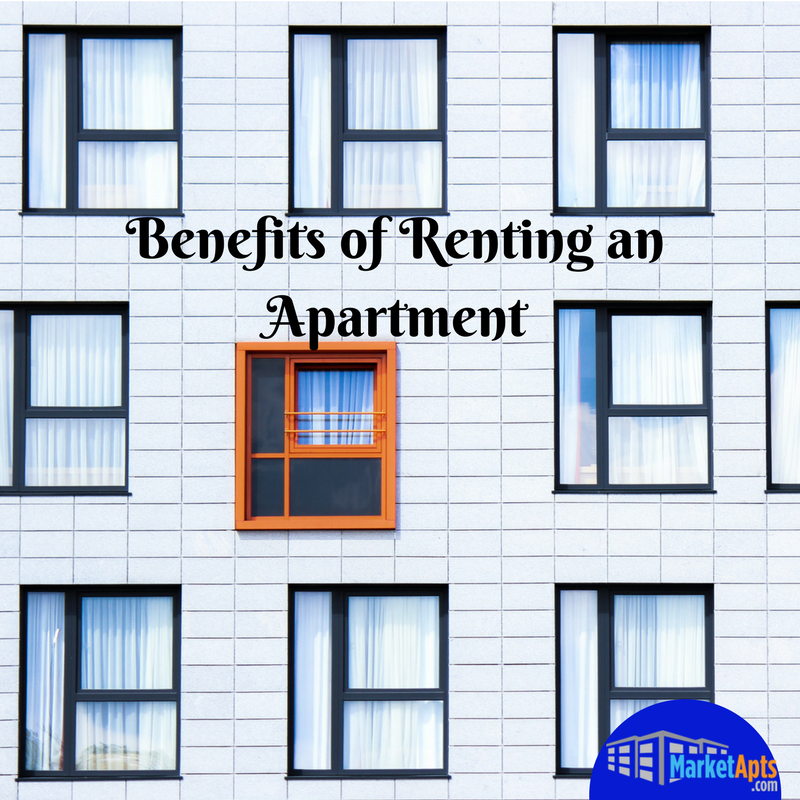
17 Benefits Of Renting an Apartment
August 10, 2017 2:17 pm 1 CommentThere are many benefits of renting an apartment! The truth is renting provides flexibility and freedom. Renters have the ability to choose the duration of their stay, allowing them to adapt to changing circumstances such as job relocations or personal preferences. Renting also frees individuals from the responsibilities and costs associated with property ownership. Owning a home can often come with a long to-do list of tasks and financial outpour.
Renting can help you save a lot of money! It requires a smaller upfront financial commitment in the form of a security deposit and monthly rent payments. This can be especially advantageous for young professionals, individuals starting families, or those who are not ready for a long-term investment. Renting simply offers flexibility, reduced responsibilities, access to amenities, and a more accessible housing option for individuals seeking temporary or affordable living arrangements.
1. Less Stress
Buying a home often comes with a lot of unnecessary stress! Renting can create less stress for several reasons. Renters are not responsible for the major expenses associated with property ownership, such as property taxes, home insurance, and maintenance costs. These financial responsibilities are typically shouldered by the landlord or property owner. Renters can feel relieved of the financial burden of owning a home and the potential stress that can arise from unexpected repairs or large expenses.
Renting provides you with continual flexibility and freedom. This flexibility allows residents to adapt their living arrangements to their circumstances. The ability to make these adjustments without the constraints of homeownership can reduce stress and provide a sense of freedom.
Additionally, renting can offer access to amenities and services that can contribute to a more convenient and stress-free lifestyle. Many people take advantage of the flexibility to choose a location that is closer to work, schools, or other amenities, reducing commute times and enhancing their routine. By alleviating financial burdens, reducing responsibilities, and providing access to amenities, renting can create a less stressful living situation compared to homeownership.

2. No Repairs
Having a landlord who is responsible for repairs and maintenance can offer several benefits for renters! It relieves tenants of the financial burden and stress that is associated with ongoing repairs. When an apartment issue arises, such as a plumbing problem or a broken appliance, renters can simply notify their property manager. It is the responsibility of the property to address and cover the costs of the repair. Apartments typically have several maintenance technicians dedicated to fixing any issue that may arise. Having all of your repairs taken care of can be beneficial for individuals or families on a tight budget, as they do not have to worry about unexpected expenses related to repairs.
Landlords also often have established relationships with maintenance professionals and local service providers. They may have access to a network of trusted contractors who can quickly address various repair needs. This can minimize the inconvenience and disruption to the tenant’s daily routine. Tenants can feel reassured that any problems that arise will be promptly addressed, enhancing their overall living experience.
3. Freedom from HOA
Not having a homeowners association (HOA) can offer several benefits to renters. The main benefit being that they will not be subject to hefty HOA fees. These fees are typically collected on a monthly or annual basis, and they can increase over time. They are intended to cover the costs of maintaining common areas, and amenities, and enforcing community rules.
Another benefit of not having an HOA is the absence of potential conflicts or disputes with the association. HOAs have the authority to enforce rules and regulations, and homeowners may find themselves at odds with the HOA. Disagreements can arise over issues such as pets, parking, noise restrictions, or even the color of the exterior. Without an HOA, tenants have greater freedom to live as they please without conflict arising.
Not having an HOA also provides you with more savings. You can experience increased freedom and autonomy over your property, the potential to avoid conflicts, fewer restrictions on property use, and greater control over financial decisions. It allows renters to have a more personalized and less strict experience, while also saving money!
4. Mobility and Freedom
Most leases carry a one-year commitment at most (and often even that is flexible), while some may have month-to-month. Committing yourself to a year is very different than giving over the next 30, and many millennials value their freedom. Especially if you’re looking to change jobs or move in the next ten years, renting is likely the right decision.
Apartment living often provides access to a range of amenities and services that would be expensive or impractical to own individually. Some properties offer amenities like swimming pools, fitness centers, community spaces, and on-site maintenance teams. These amenities enhance the quality of life for residents, providing convenience and recreational opportunities. By having access to shared facilities, individuals can enjoy a higher standard of living without the burdensome costs.
Apartments offer mobility and freedom by providing flexibility in terms of duration of stay, relieving individuals from the responsibilities of homeownership, providing access to shared amenities, offering financial flexibility, and enabling individuals to live in desirable locations. These factors contribute to a more adaptable lifestyle, allowing individuals to embrace new opportunities. Residents have better experiences while enjoying the convenience and amenities that come with apartment living.

5. Ease of Upsizing & Downsizing
Living in an apartment offers ease when it comes to both upsizing and downsizing, providing individuals with the flexibility to their changing needs. When upsizing, individuals can easily transition to a larger apartment within the same complex. They can also explore other apartment options that better accommodate their growing family or increased space requirements.
The process is relatively straightforward since there is no need to navigate the complexities of selling a house or dealing with property transfers. Upsizing in an apartment allows for a seamless transition to a more spacious living environment without the financial burdens and logistical challenges associated with homeownership. On the other hand, downsizing in an apartment is equally convenient.
Overall, living in an apartment provides the ease and flexibility to change your layout as needed. This allows individuals to align their living arrangements with their changing circumstances and preferences.
6. Convenience of Location
Apartments provide location convenience in several ways, making them an attractive housing option for individuals seeking easy access to the most desirable areas. Most properties are often strategically located in urban centers or highly sought-after neighborhoods.
Additionally, apartments offer access to public transportation networks. Many options are situated near major transportation hubs or have convenient access to bus or train routes. This proximity to public transportation makes commuting to work or exploring the city easier and more convenient. It can reduce reliance on private vehicles, saving both time and money on transportation costs.
Apartment living can be advantageous for individuals who prioritize proximity to their workplace or educational institutions. By selecting an apartment near their place of work or study, residents can significantly reduce commute times and enjoy a better work-life balance. This can lead to less stress and more time for personal pursuits and leisure activities.
7. Environmental Impact
Apartments contribute to environmental sustainability in several ways:
- Efficient Use of Space: Apartments typically occupy smaller footprints compared to single-family homes, allowing for more efficient land use and preserving open spaces. This helps to minimize urban sprawl and protect natural habitats.
- Energy Efficiency: Apartment buildings often incorporate environmental design features such as improved insulation, energy-efficient appliances, and energy-saving lighting.
- Shared Resources: In apartment buildings, resources such as heating, cooling, and water systems are often shared among multiple units. This promotes more efficient use of resources and reduces overall energy consumption compared to individual homes with separate systems.
- Reduced Carbon Footprint: Apartments generally have a smaller carbon footprint due to their compact size and shared infrastructure. They require less energy for heating and cooling and often have a smaller overall environmental impact compared to larger, detached homes.
- Public Transportation Access: Apartments are often located in urban or transit-friendly areas, making it easier for residents to access public transportation. This promotes reduced reliance on private vehicles, leading to lower emissions and congestion.
- Walkability and Bike-Friendly Infrastructure: Apartments situated in walkable neighborhoods with bike lanes and pedestrian-friendly infrastructure encourage residents to choose active modes of transportation. This reduces reliance on cars, lowers pollution, and improves personal health.
- Waste Management: Many apartment complexes have designated recycling and trash systems in place. These initiatives promote responsible waste disposal, recycling, and composting, reducing the amount of waste sent to landfills.
- Green Building Certifications: Some apartment buildings pursue green building certifications, such as LEED (Leadership in Energy and Environmental Design), which ensures that they meet high standards of sustainability in areas such as energy efficiency, water conservation, and indoor air quality.
- Sustainable Amenities: Apartments often offer shared features like community gardens, green spaces, and eco-friendly features like rainwater harvesting systems. These initiatives promote sustainable practices and foster a connection to nature.
- Environmental Awareness: Living in an apartment community can foster a sense of environmental consciousness. Residents often have opportunities to participate in eco-friendly initiatives, such as community-wide recycling programs or sustainability-focused events, further promoting environmental awareness and responsible living.
Overall, apartments contribute to the environment in many different ways! By embracing these practices, apartment living can have a positive impact on the environment and support a more sustainable future.

8. No Housing Market Crashes
One significant benefit of not dealing with housing crashes is greater financial stability. Housing crashes can have devastating effects on property values, leading to a decline in home equity and potentially leaving homeowners with properties worth less than their mortgage balances. By avoiding housing crashes, individuals can maintain their investments. Renting can help avoid the financial stress and potential hardship associated with a significant loss in property value.
More stability allows renters to focus on building wealth, planning for the future, and maintaining a solid financial foundation. Renting also reduces the risk of foreclosure, preserves confidence in homeownership, and contributes to overall financial well-being. Ultimately, not experiencing housing crashes provides tenants with peace of mind and a more positive renter experience.
9. Flexibility of Short-Term Lease
Short-term leases offer several benefits for tenants looking for temporary or flexible housing arrangements. They are ideal for individuals who prefer to test the waters in a new area or want to experience living in different neighborhoods before making a long-term commitment. Short-term leases allow tenants to explore different areas, amenities, and communities without being locked into a specific location for an extended period. Short-term leases are useful for individuals who are new to an area or are considering a permanent move but want to ensure it meets their needs and preferences.
Additionally, short-term leases provide greater flexibility for lifestyle changes. Life circumstances can change unexpectedly, such as job relocations, family situations, or personal preferences. Having a short-term lease allows tenants to adapt their living arrangements more easily when these changes occur. You won’t be stuck with the constraints of a long-term commitment or the complexities of selling or terminating a long-term lease.
10. Absence of Property Value Concerns
Not having property value concerns can bring several benefits and peace of mind to all renters. It eliminates the stress and uncertainty associated with fluctuations in the real estate market. You can focus on enjoying your home and building a life without being preoccupied with the potential ups and downs of property prices. They do not have to constantly monitor market trends, worry about negative equity, or fear a significant decrease in their property’s value.
Additionally, not having property value concerns allows renters to prioritize their home as a place to live rather than solely as an investment. They can focus on personalizing and improving their apartment according to their preferences and needs, without being solely driven by potential resale value. You can experience a greater sense of satisfaction and emotional attachment to the property.
11. Less Utility Cost
Property managers swallow a lot of costs in exchange for good residents often including water, trash, sewer, and sometimes gas expenses. Again, while these might be incorporated into your monthly rent, you’ll be paying much less in utilities on a 2 bedroom unit than on a three-story Victorian house in the suburbs.
Plus, with many new apartment complexes being built to keep up with increased demand, your utilities are likely to have less of an environmental impact. If your appliances are newer, they’re likely to be of greater benefit to the planet, not to mention less floor space means less consumption (and less pollution).
12. Safety & Security
Apartment complexes offer several safety and security features that contribute to the well-being and peace of mind of residents:
- Controlled Access: Many apartment complexes have controlled access points, such as gated entrances or secure entry systems. These measures restrict unauthorized individuals from entering the premises, providing an added layer of security and preventing potential intruders.
- On-Site Staff and Maintenance: Apartment complexes often have property managers, maintenance personnel, and security personnel. This presence ensures that there are individuals readily available to address security concerns, respond to emergencies, and promptly attend to maintenance issues, promoting a safer living environment.
- Surveillance Systems: Many apartment complexes are equipped with surveillance cameras strategically placed throughout the premises. These cameras can help deter criminal activity and provide valuable evidence in the event of incidents. The presence of surveillance systems can also increase residents’ sense of security.
- Well-lit Common Areas: Apartment complexes typically maintain better lighting parking lots, hallways, and common spaces. Adequate lighting enhances visibility and reduces the risk of accidents or criminal activity, making residents feel safer when moving throughout the complex, especially during nighttime hours.
- Security Alarms and Intercom Systems: Some apartment complexes have security alarm systems installed in individual units or common areas. These alarms can act as a deterrent and provide immediate notification of unauthorized entry or emergencies. Intercom systems allow residents to control access to their units and communicate with visitors before granting entry.
13. Stable Monthly Costs
Homeowners face surprise costs built into their house: any upkeep, broken appliances, property taxes that can vary, lawn services, and more. With renting, aside from utilities, you can plan on a very stable monthly cost. Stable finances allow you to better financially plan for your future. You can better manage your budget and avoid any surprise expenses related to housing.
14. Financial Flexibility
Apartments provide financial flexibility by offering several advantages over homeownership that allow individuals to allocate their financial resources more flexibly. Renting an apartment typically requires a smaller upfront financial commitment compared to buying a home, as it doesn’t involve a down payment or mortgage costs. Apartments also free individuals from the financial responsibilities of property maintenance and repairs, as those costs are typically borne by the landlord or property management. This can provide relief from unexpected expenses and allow for better budgeting and planning.
Apartments offer the freedom to choose a location and size that aligns with one’s current financial situation and needs. This flexibility enables individuals to adapt their living arrangements as their financial circumstances change, whether it’s upgrading to a larger unit as income increases or downsizing to reduce expenses. Overall, apartments provide financial flexibility by reducing upfront costs, relieving maintenance responsibilities, and offering the ability to adjust housing choices according to financial needs and goals.
15. Personal & Community Amenities
Pools, enclosed BBQs, dog parks, and dog wash stations are all amenities you can search for and find in reasonably-priced apartment communities. While these features would drive the price of a house up significantly, apartments understand the value of great amenities and offer them to residents more and more frequently.
16. Social Benefits
Living in an apartment offers several social benefits! It often promotes a greater sense of community and social interaction. The proximity of neighbors and shared amenities encourage opportunities for casual encounters, fostering connections and friendships. Apartment complexes may also organize community events and gatherings, providing residents with occasions to socialize and get to know one another. This sense of community can combat feelings of isolation and create a support network within the complex.
Apartment life also allows individuals to be part of a diverse community, as complexes often attract a mix of residents from different backgrounds and walks of life. This diversity can broaden horizons, encourage cultural exchange, and promote tolerance and understanding among neighbors.
17. Furnished Options
The availability of furnished apartments provides several benefits for individuals seeking housing options. Firstly, it offers convenience and saves time and effort. Furnished apartments come equipped with essential furniture and appliances, eliminating the need to purchase, transport, and assemble furniture items. This is particularly beneficial for individuals who are relocating, have a temporary housing need, or prefer not to invest in furniture for a short-term stay. The convenience of a furnished apartment allows tenants to move in quickly and start living comfortably without the hassle of furnishing a space from scratch.
Further Insights into Apartment Renting
Insights into Rental Housing: A study, featured in the Journal of Planning Education and Research, examines rental housing markets across the United States using data obtained from Craigslist. The research reveals that certain metropolitan areas have a meager percentage of listings below fair market rent, indicating a potential affordability issue in these regions.
Reducing Energy Consumption in Apartments: Another research published in the Proceedings of the National Academy of Sciences (PNAS) uncovers a fascinating link between individual energy consumption and apartment living. The study demonstrates that when electric energy consumption (EEC) is billed and metered at the apartment level, the annual EEC drops by approximately 25%. These findings suggest that implementing individual metering systems can significantly reduce energy consumption within apartments.
Enhancing Rental Market Insights: Existing sources of data on rental housing, such as the census or commercial databases, fail to reflect recent market activity or provide a comprehensive overview of the US rental market. However, nontraditional sources of volunteered geographic information offer planners real-time, local-scale estimates of rent and housing characteristics that are currently lacking in alternative sources like census data.
Exploring the Lesser-Known Benefits of Apartment Life
Embrace Cultural Exchange: One of the remarkable aspects of living in an apartment complex is the opportunity it offers for diverse cultural exchange. Within the community, you’ll find individuals from a variety of backgrounds and cultures, fostering an environment that encourages meaningful interactions and the sharing of unique traditions, lifestyles, and perspectives.
Prioritize a Healthy Lifestyle: Many apartment complexes are equipped with fitness centers and conveniently situated near parks or recreational areas. This advantageous location empowers renters to effortlessly maintain a healthy lifestyle, eliminating the need for costly gym memberships or lengthy journeys to access outdoor spaces.
Immerse Yourself in City Life: Apartments, particularly those nestled in vibrant city centers, grant you easy access to an array of exciting city events and activities. From lively music festivals and delightful farmer’s markets to captivating city-wide celebrations, residing in an apartment places you right in the heart of the dynamic urban scene.
Discover Upscale Living: Renting an apartment presents an enticing opportunity to reside in high-end or upscale areas that might otherwise be financially out of reach. This exclusive privilege allows you to relish in the luxuries of these sought-after neighborhoods, including exceptional local amenities, enhanced safety measures, and an esteemed address.
Minimal Impact on Credit Score: Unlike a mortgage, renting an apartment generally has a lesser impact on your credit score. This proves advantageous for those aiming to improve their credit or seeking to avoid the significant financial commitment associated with homeownership that could potentially affect their creditworthiness.
Commute with Ease: Apartments are often strategically situated in urban areas or close to bustling business districts, resulting in significantly reduced commute times for those employed in these vibrant locations. Less time spent traveling means reduced stress levels and more leisure time at your disposal.
Cost-Sharing Made Simple: If you’re open to the idea of having roommates, renting an apartment provides a seamless way to split costs. This shared financial responsibility makes apartment living even more economical as you divide both rent and utility expenses, lightening the burden on your budget.
Peace of Mind during Natural Disasters: Homeowners often face immense emotional stress during natural disasters due to the potential damage and financial implications it may have on their property. As a renter, you are spared from the same level of financial investment, allowing you to experience less emotional strain during such events.
Embrace Minimalism: The limited space offered by apartments can serve as an invitation to embrace a minimalist lifestyle. With fewer square feet to fill, you’ll naturally reduce clutter, spend less time on cleaning and organizing, and have more freedom to dedicate to other fulfilling activities.
Effortless Maintenance: Due to their smaller size in comparison to houses, apartments generally require less time and effort to keep clean. This convenience translates to more leisure time and a reduced burden when it comes to maintaining a tidy living space.
Interested in learning more about apartments and apartment marketing?
Categorised in: Apartment Marketing
This post was written by Isabella Housel
Isabella Housel is a passionate and versatile professional writer with a deep love for words and a commitment to crafting compelling content that engages, informs, and inspires. With many years of experience in the industry, she has honed her skills across various genres, from creative storytelling to informative articles and technical documentation.






1 Comment
It’s nice that you talked about how renting could let you plan on a very stable monthly cost aside from utilities. My wife and I are looking for a new place to live in, however, we thinking getting a house would be too expensive. So with that in mind, we are thinking of looking for a two bedroom apartment for rent instead.